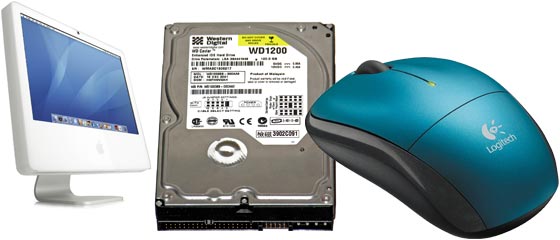 ![[Header]](../XuShared2/Line3.jpeg)

Add a Comment (Go Up to OJB's Blog Page) More Thoughts on ThoughtEntry 1669, on 2014-07-22 at 21:14:06 (Rating 2, Computers) Which is more amazing, the human brain or the modern computer? That is a discussion I heard in a waiting room (the source of many meaningful insights) recently. The consensus amongst those involved seemed to be that computers suck and that humans are far more impressive, but is this true?
Well yes, in many ways it is, although the way some people use that great asset (their brain) does leave me wondering about its true value.
But I think the critical point that most people seem to overlook is that although the two are superficially the same in fact they excel at quite different things. Computers are awesome at performing simple, well defined functions perfectly and at incredible speed, and the brain excels at doing poorly defined things slowly and inaccurately but massively in parallel.
So computers compute but brains think. Yes, as I concluded in my earlier blog post "Can Computers Think?" it seems to me that no current computer can think and that a new paradigm will be necessary before they can. There seems to be something fundamentally different between brains and computers - but, no, it is nothing to do with dualism or a non-physical soul - it's just a matter of the actual operating process.
There are two ways that computers might be able to think in the future: first, they could be built on different principles to today which are more like brains; and second, they could be built in the same as they are now and that functionality could be emulated in software. Both of these techniques are being pursued and it seems like only a matter of time before one or both succeed (assuming that the old problem of defining exactly what thinking actually is can be solved).
But now I want to forget about thinking and get on to what computers are very good at: calculating...
The fastest computer can perform at 34 petaFLOPS (34 thousand trillion floating point operations per second). That is a really impressive number, but how impressive? Well imagine every human in the world (let's say there are 7 billion) can do a floating point calculation accurately in 10 seconds (this is extremely unlikely, even with a calculator). How long would it take them to do what this one computer can do in a second? According to my calculations the answer is one and a half years.
To put it another way, the computer is 340 thousand trillion times faster than a single human. That is an impressive result, even if it involves no thought! And remember the computer guarantees an accurate answer every time. If I asked you to do a calculation like 3.7683468901364814567 x 513.76109875242345209 what do you think the chances are of you getting it right?
So computers are impressive too but in a different way. And the abilities of thinking humans and calculating computers seem to complement each other. Unfortunately for the human part of the equation it seems that computers might eventually be able to do both!
 Comment 1 (4094) by richard on 2014-07-25 at 00:44:27:
Readers may be very pleased to hear that I will keep well out of this one on computers and thought! LOL. Great article Owen. Cheers!  Comment 2 (4097) by OJB on 2014-07-25 at 10:51:53:
Yeah I was trying (but not entirely succeeding?) to keep this one fairly non-confrontational! 
You can leave comments about this entry using this form. To add a comment: enter a name and email (both optional), type the number shown above, enter a comment, then click Add.
Note that you can leave the name blank if you want to remain anonymous.
Enter your email address to receive notifications of replies and updates to this entry.
The comment should appear immediately because the authorisation system is currently inactive.
![[Comments]](../XuShared/Comment1B.jpeg) ![[Preview]](../XuShared/Comment6B.jpeg) ![[Blog]](../XuShared/Up2B.jpeg)
Insert query failed: INSERT INTO log VALUES (NULL,1,'2025-12-26','204649','BlogPage.html%3Fcode=1669','XuBlog','216.73.216.208','Mozilla/5.0 AppleWebKit/537.36 (KHTML, like Gecko; compatible; ClaudeBot/1.0; +claudebot@a','');. |

![[Comments]](../XuShared/Comment1B.jpeg)
![[Preview]](../XuShared/Comment6B.jpeg)
![[Blog]](../XuShared/Up2B.jpeg)